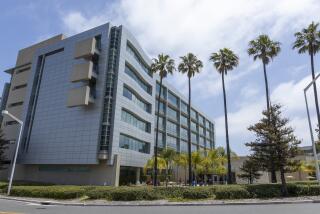Students’ Debts, Lack of Civic Responsibility Decried in Study
- Share via
WASHINGTON — Colleges are graduating students with too many debts and too little sense of civic responsibility and entrepreneurial drive, a Carnegie Foundation report said Monday.
The study, by Frank Newman, president of the Education Commission of the States, urges research universities to overcome what it calls their antipathy toward technology and to apply “the fruits of research . . . to practical problems in industry, the environment and society.”
To produce a new generation of civic and business leaders equipped to handle economic challenges from abroad, colleges must stop “stifling the inherent creativity of the student” and start encouraging risk-taking.
Loans Attacked
The report, Higher Education and the American Resurgence, decried the trend to saddle students with loans as the main form of federal student aid.
The spiraling Guaranteed Student Loan program is “way out of bounds,” Newman told a news conference. “Student aid programs should be expanded, not contracted,” with greater emphasis on such programs as Work-Study, which subsidizes campus jobs.
He said more of the $8 billion in federal student aid should be offered in exchange for public service, either during the undergraduate years or afterwards as teachers or other community workers.
Newman, a former president of the University of Rhode Island, wrote: “Excessive loans inadvertently undercut traditional values. Working one’s way through college is a cherished American concept that conflicts head-on with, ‘Go now, pay later.’
“A student who leaves college with a large debt burden may well feel he has already assumed all of the risk that he possibly should,” Newman said.
Report Praised
Ernest L. Boyer, president of the Carnegie Foundation for the Advancement of Teaching, said Newman’s white paper “sets the agenda for a vigorous new debate about the federal government’s relationship to the nation’s higher learning institutions.”
Newman said the U.S. system of higher education--enrolling more than 12 million students, including half of all who graduate from high school--is still “the best in the world.”
But “despite its high quality, American higher education must be even more effective if it is to meet the needs of this country in the decade ahead,” he said.
The report decried students’ materialism, saying: “By every measure we have been able to find, today’s graduates are less interested in and less prepared to exercise their civic responsibilities.”
Societal Shift
Newman said the United States built its past economic success on “a hierarchical, mass-produced society. Now, we’ve begun to shift more and more toward creative, entrepreneurial activities.”
Newman held out automobile magnate Henry Ford and civil rights leader Dr. Martin Luther King Jr. as models of the entrepreneurial spirit in America. He cited the nuclear arms race, toxic wastes, integration, genetic engineering and reduction of crime, drugs and violence as issues that cry out for an active citizenry.
“Students too frequently sit passively in class, take safe courses, are discouraged from risky or interdisciplinary research projects and . . . from challenging the ideas presented to them,” the study said.
Newman prepared the report in consultation with independent experts and Carnegie board members, including more than 20 university presidents who are members of the foundation board.
More to Read
Sign up for Essential California
The most important California stories and recommendations in your inbox every morning.
You may occasionally receive promotional content from the Los Angeles Times.













